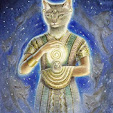Richard Wagner, TRISTAN UND ISOLDE
Royal Opera House, Covent Garden, Friday 5 December 2014
Cast
Sailor ED LYON
Isolde NINA STEMME
Brangaene SARAH CONNOLLY
Kurwenal IAIN PATERSON
Tristan STEPHEN GOULD
Melot NEAL COOPER
King Marke JOHN TOMLINSON
Shepherd GRAHAM CLARK
Steersman YURI YURCHUK
Chorus and Orchestra of the Royal Opera House, Covent Garden.
Conductor ANTONIO PAPPANO
Director CHRISTOF LOY
It is perhaps a good thing that TRISTAN UND ISOLDE is performed comparatively rarely, as it would be difficult to cope with the emotional strain of seeing and hearing it more than once a year! (Once every five years in the case of this production).
This is the second time I have seen the production, and I still love the actual staging - spare, minimalist, stripped to its essentials, so that the drama and the music flourish unimpeded. I realise it caused (and still causes) some controversy, and I am happy the unnecessary canoodling between Kurwenal and Brangaene has been toned down so that it is no longer obtrusive. ( I didn't see the point, but that was my only criticism of the production).
As I said when I wrote about this production last time, nothing much 'happens' in TRISTAN UND ISOLDE, in terms of stage business.....the first act is narrative, the exposition....and, crucially, it is about Isolde's misunderstanding of her own feelings, not being able to admit that she doesn't hate Tristan, she loves him with a deep passion, and this is why she sees death as the only way out. And how eloquently Nina Stemme conveyed all the tangled complications of Isolde's feelings - angry, passionate, almost hysterical at times, and bitterness at the beginning of her confrontation with Tristan It isn't only that she has a beautiful voice, she brings such commitment to the characterisation of Isolde, the storms of emotion that batter her soul. At the beginning of the opera, she is wearing a white (wedding?) dress, then changes into black for her confrontation with Tristan. The simplicity of the costumes (for all the characters) is another characteristic of this production.
What I have said about Nina Stemme in fact applies to all the performers - they all meshed wonderfully together, with excellent rapport, and all were experts at characterisation. Sarah Connolly in beautiful voice as Brangaene, her mezzo a perfect foil to the soprano of Nina Stemme, and a very sympathetic, warm character, who obviously has her own ideas as to how deep-rooted Isolde's aversion to Tristan really is.
Stephen Gould distinguished himself as Tristan, rising to heights of intensity especially in the delirious ravings of Act III, almost frightening, it was so believable. He also created a good balance of tenderness and passion during the Love Duet . I love this image from Act II - she starts setting the table for them, but then they get so involved in their discussion of the nature of love that they forget about it....
Iain Patterson was good as Kurwenal, bluff, soldierly, managing to convey his dislike of Isolde (and Brangaene) with body language as much as tone of voice. But - I am very much afraid we are witnessing the beginning of John Tomlinson's vocal decline. True, the shakiness of his voice did add to the poignancy of King Marke's lament (I always grieve for King Marke, whom Wagner portrays as a much more noble character than his counterpart in the medieval sources). But he just no longer has the ringing sonority he had when he was in his prime, although he did convey very movingly the idea of an older man crushed by grief. Think how sad it is for him - he loved and admired Tristan, he adored Isolde, even though he had apparently never tried to consummate the marriage.....and they repay him like this.
I have to say that this time I was rather disappointed with Pappano's conducting of the Prelude, it seemed rather hesitant and tentative, and didn't immediately plunge you into the world of strange chromaticism that Tristan and Isolde inhabit. But I can't fault the orchestral playing in later Acts - the Love Duet opens out onto a plateau of utter gorgeousness. (Pity about the idiot behind me who had FORGOTTEN TO TURN OFF THEIR PHONE).
I'll finish with an extract from Swinburne's TRISTRAM OF LYONESSE which he could not have written without Wagner. (Probably reading Swinburne's version wasn't the best way to come down from my Wagner-induced high, but there you are!!)
Stephen Gould distinguished himself as Tristan, rising to heights of intensity especially in the delirious ravings of Act III, almost frightening, it was so believable. He also created a good balance of tenderness and passion during the Love Duet . I love this image from Act II - she starts setting the table for them, but then they get so involved in their discussion of the nature of love that they forget about it....
Iain Patterson was good as Kurwenal, bluff, soldierly, managing to convey his dislike of Isolde (and Brangaene) with body language as much as tone of voice. But - I am very much afraid we are witnessing the beginning of John Tomlinson's vocal decline. True, the shakiness of his voice did add to the poignancy of King Marke's lament (I always grieve for King Marke, whom Wagner portrays as a much more noble character than his counterpart in the medieval sources). But he just no longer has the ringing sonority he had when he was in his prime, although he did convey very movingly the idea of an older man crushed by grief. Think how sad it is for him - he loved and admired Tristan, he adored Isolde, even though he had apparently never tried to consummate the marriage.....and they repay him like this.
I have to say that this time I was rather disappointed with Pappano's conducting of the Prelude, it seemed rather hesitant and tentative, and didn't immediately plunge you into the world of strange chromaticism that Tristan and Isolde inhabit. But I can't fault the orchestral playing in later Acts - the Love Duet opens out onto a plateau of utter gorgeousness. (Pity about the idiot behind me who had FORGOTTEN TO TURN OFF THEIR PHONE).
I'll finish with an extract from Swinburne's TRISTRAM OF LYONESSE which he could not have written without Wagner. (Probably reading Swinburne's version wasn't the best way to come down from my Wagner-induced high, but there you are!!)
And with strong trembling fingers she strained fast
His head into her bosom; till at last
Satiate with sweetness of that burning bed,
His eyes afire with tears, he raised his head
And laughed into her lips; and all his heart
Filled hers; then face from face fell, and apart
Each hung on each with panting lips, and felt
Sense into sense and spirit in spirit melt.
"Hast thou no sword? I would not live till day,
O love, this night and we must pass away,
It must die soon, and let not us die late."
"Take then my sword and slay me; nay, but wait
Till day be risen; what, wouldst thou think to die
Before the light take hold upon the sky?"
"Yea, love; for how shall we have twice, being twain,
This very night of love's most rapturous reign?
Live thou and have thy day, and year by year
Be great, but what shall I be? Slay me here;
Let me die not when love lies dead, but now
Strike through my heart: nay, sweet, what heart hast thou?
Is it so much I ask thee, and spend my breath
In asking? nay, thou knowest it is but death.
Hadst thou true heart to love me, thou wouldst give
This: but for hate's sake thou wilt let me live."






































.jpg)







